Elgin Marbles: What are they and why is there a row about them?
- Published
- comments
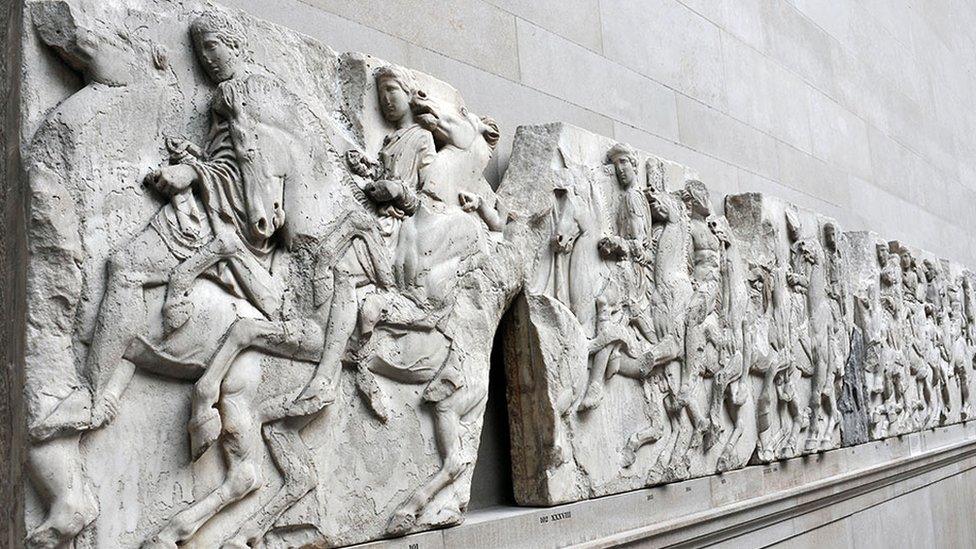
The sculptures, which are originally from the temple of Athena in Greece, were brought to Britain by Lord Elgin
An argument between the British and Greek governments over some of the finest ancient Greek sculptures in the world has become a deepening row this week.
There is a longstanding disagreement between the UK and Greece about the ownership of marble sculptures brought to Britain in the 1800s.
The sculptures in question are the Parthenon Sculptures, also known in the UK as the Elgin Marbles, named after Lord Elgin who had them removed from a temple in Greece.
They are widely believed to be one of the most important collections of classical art in existence.
But what are the Parthenon Sculptures/Elgin Marbles and why is there a row about who owns them?
What are the Elgin Marbles/ Parthenon Sculptures?
The marble sculptures were made between 447BC and 432BC to decorate the Parthenon, an ancient Greek temple dedicated to the goddess Athena.
The sculptures formed part of a frieze, which is a collection of artwork mounted across a wall, and were originally displayed high up above the columns of the building.
The ruins of the Parthenon temple sit among a group of ancient temples called the Acropolis, built on a high, rocky hill in Athens.
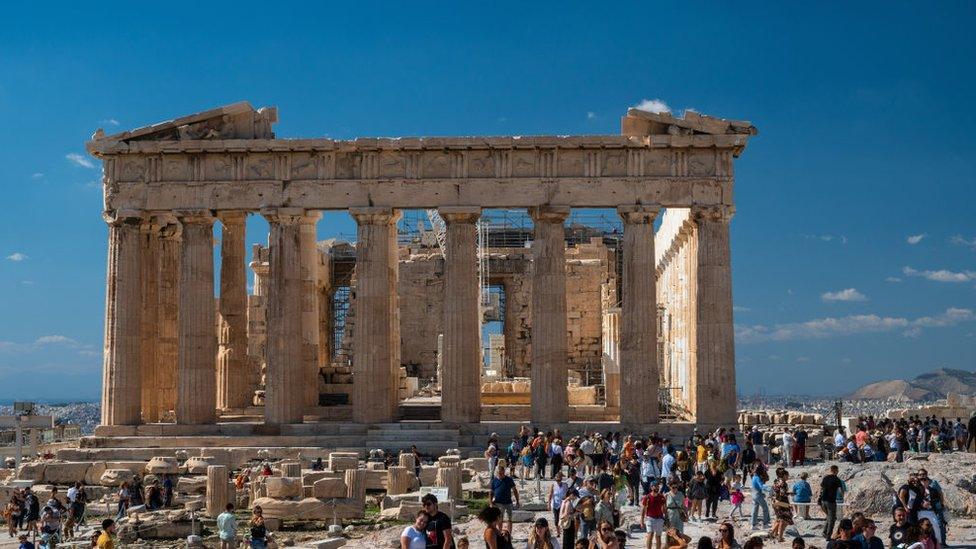
The sculptures were originally created as part of the Parthenon temple in Athens
Why were they moved?
In the 19th Century, the British ambassador and art lover Lord Elgin claimed he was granted permission by the Ottoman Empire, the governing authority in Athens at the time, to remove some of the sculptures.
The truth behind his claims remain disputed and is one of the main reasons for the row.
In 1816 a UK parliamentary inquiry found that Lord Elgin had acquired the marbles legally, he then sold them to the British Museum.
But campaigners who want the sculptures to be returned to Greece, including the Greek government, say the permission Lord Elgin obtained from the Turkish authorities was invalid because the Turks were a foreign, invading force who were not acting in the interests of the Greek people.
At the time they were removed between 1801 and 1805, the Parthenon temple was in a poor condition, having been partially destroyed by early Christians, the building was later converted into a mosque and then used as a place to store weapons.
Up to 247ft of the 524ft frieze was acquired for preservation by the British Museum in London where they were put on display for the general public in 1807.
Neil Macgregor, a former director of the museum, previously said: "Elgin believed he was rescuing the sculptures from the risk of further damage".
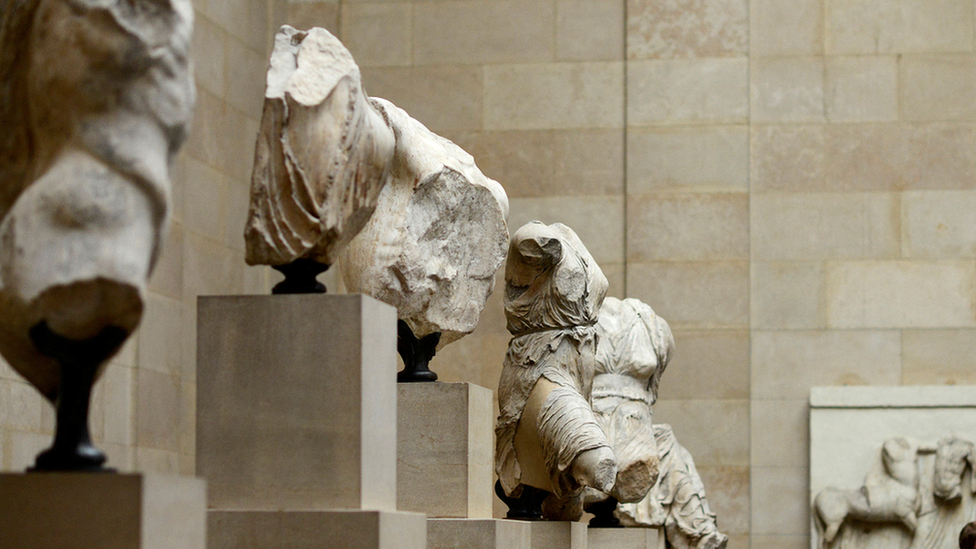
Seventeen life-size marble statues also form part of the disputed art collection
How much was removed?
The marbles taken to Britain include about half of the sculpted frieze that once ran all round the building, plus 17 life-sized marble figures from its gable ends (the triangular part where the walls meet the roof) and 15 of the 92 sculpted panels, originally displayed high above its columns. About 30% of the remaining original sculptures are in Athens.
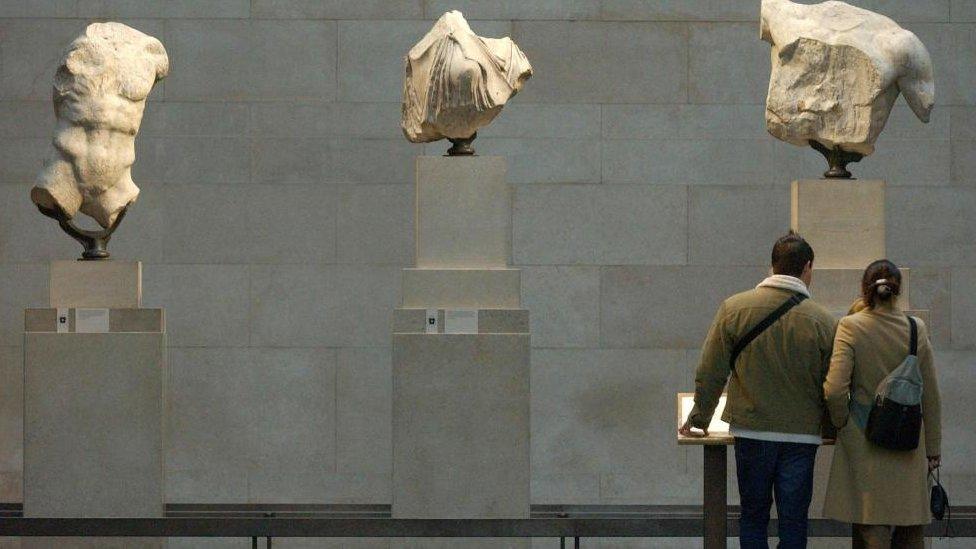
What does the Greek government say?
The Greek government has been calling for the artefacts to be returned since the 19th Century, and first made a formal request to the British Museum in 1983 for their permanent return.
Campaigners argued they were taken illegally or unethically and say they are of exceptional cultural importance and value to the Greek nation as a whole.
The Parthenon Gallery at the Acropolis Museum in Athens was built in 2009 to house the sculptures. The exhibition combines the original marble sculptures with plaster copies of those held in the British Museum and other foreign museums.
Why haven't they been returned?
A law called the 1963 British Museum Act prevents the removal of objects from the British Museum's collection and a spokesperson for the UK government said there were "no plans" to change the law.
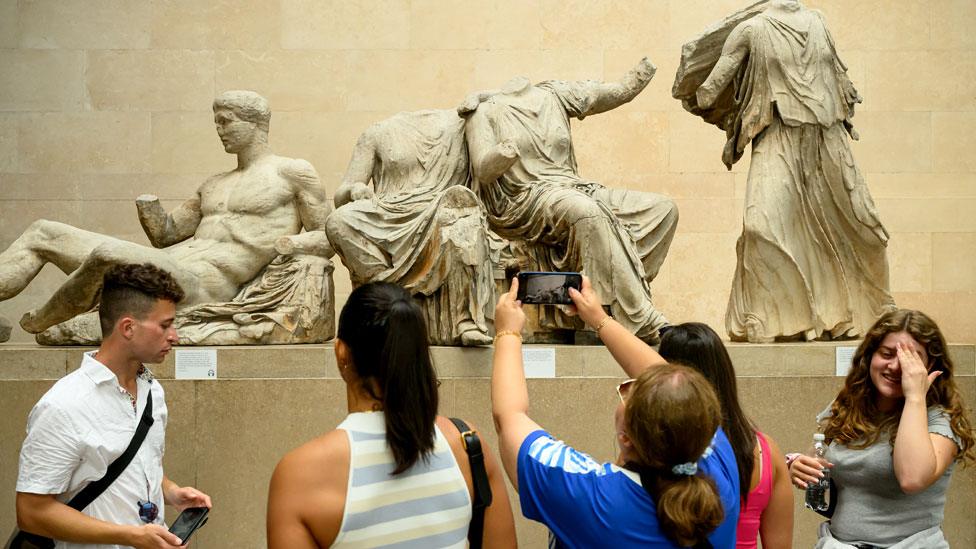
The British Museum says millions of visitors from around the world view the Greek sculptures each year at the museum free of charge
A spokesman said earlier this year: "The British Museum has cared for the Parthenon Sculptures for generations and each year millions of people from across the globe see these treasures free of charge."
However, the trustees of the British Museum are exploring the possibility of a special loan arrangement with Greece.
The chair of the British Museum, George Osborne, previously said he was looking to find "some kind of arrangement to allow some of the sculptures to spend some of their time in Greece".
He told the UK government's Culture, Media and Sport Committee in October that any deal would have to see "objects from Greece coming here" to the UK for the first time.
The Labour Party says if the British Museum and the Greek government came to a loan agreement, it would not stand in the way, if Labour was elected to form the government at the next general election.
What has the Greek prime minister said?
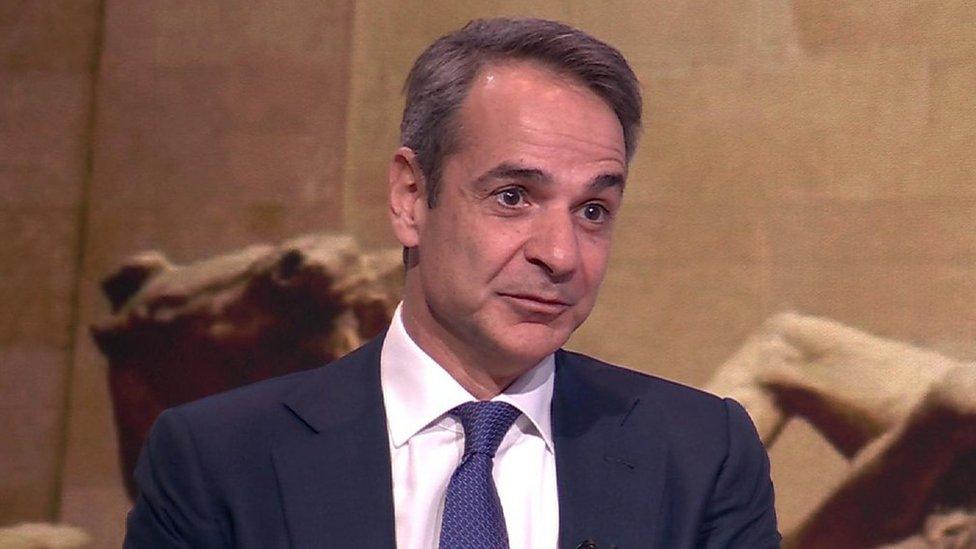
Number 10 said the Greek Prime Minister Kyriakos Mitsotakis was due to meet UK Prime Minister Rishi Sunak, but they were not due to discuss the marbles
The row has recently reignited as the Greek Prime Minister Kyriakos Mitsotakis was due to meet UK Prime Minister Rishi Sunak during a visit to London this week.
At the last minute Mr Sunak cancelled the meeting with his Greek counterpart.
Downing Street said it believed it had assurances from the Greek government their prime minister would not speak publicly about the Parthenon Sculptures on his visit to the UK because of their countries' long-held differences of opinion about them, and said diplomatic talks were expected to focus on other topics.
The Greek government denied this.
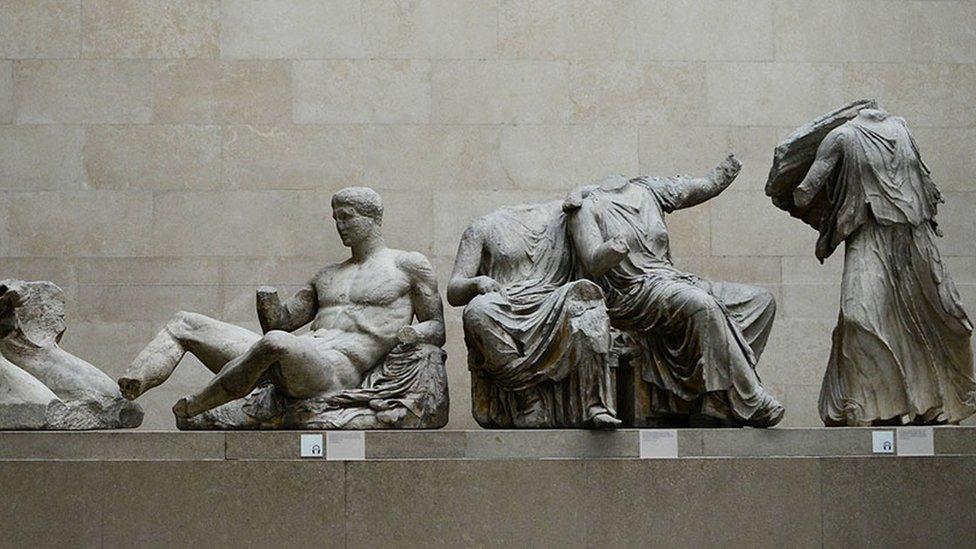
UK Prime Minister Rishi Sunak cancelled a meeting with the Greek Prime Minister Kyriakos Mitsotakis at which the latter had hoped to raise the issue of the marbles
A spokesman for the UK government said it was a "matter of regret" that no meeting would now take place and said Mr Mitsotakis had turned down a secondary offer to meet the Deputy Prime Minister Oliver Dowden instead.
Speaking to BBC reporters ahead of the cancellation, Mr Mitsotakis said he was "disappointed" not to be able to discuss the issue with Mr Sunak.
"Those who firmly believe in the correctness and justice of their positions are never hesitant to engage in constructive argumentation and debate," he added.
Mr Mitsotakis continued: "Greece and Britain share longstanding ties of friendship, and the scope of our bilateral relations is extensive.
"Our positions on the matter of the Parthenon Sculptures are well-known.
"I had anticipated engaging in a discussion with my British counterpart on this issue, as well as addressing significant global challenges such as the situations in Gaza and Ukraine, the climate crisis, and migration."
If you cannot see the quiz, click here.
